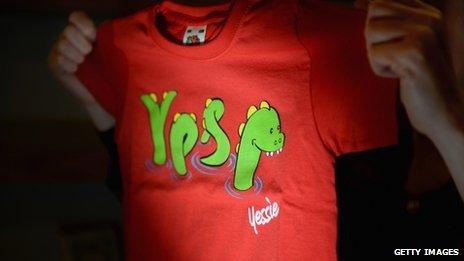Independence - business leaders come out in support
- Published
- comments

Another day, another chapter in the "so, would independence be good for business?" debate.
This morning Business for Scotland (the clue is in the title) released a letter with 200 signatories saying that a Yes vote on September 18 would be good news for the Scottish economy.
That followed a letter yesterday organised by Keith Cochrane, the chief executive of the engineering company, Weir Group, which brought together 130 business people who said that the case for independence "had not been made".
That letter argued it was better to stay within the UK.
Today's pro-independence letter is based on three key arguments.
Firstly, that policies enacted by an independent Scottish government would be more attuned to the needs of entrepreneurs and businesses big and small based north of the border.
Alex Salmond, the First Minister, has for example said that business tax reform would boost employment prospects.
Willie Walsh, the chief executive of International Airlines Group (the owners of British Airways), has said that he would have no problem with Scottish independence. It may even lead to the ending of the much maligned airport passenger duty.
You can read about his thoughts here
Secondly - and this is connected - today's letter claims that Westminster's record on husbanding the Scottish economy has not been a good one.
"The tax raids on our oil industry and pensions funds by Labour and Conservative-led governments are clear examples of a short-term focus rather than a long-term strategy," the letter says.
Thirdly, the letter argues that the UK is at risk from an exit from the European Union, certainly a negative for many businesses.
Those concerned about the impact independence could have on the Scottish economy point out that the letter does not deal with Scotland's own membership of the European Union should it vote to separate from the UK.
Some argue that other EU members such as Spain - with its own nationalist movements - would be nervous about making membership for Scotland automatic and simple.
Here are Spanish Prime Minister Mariano Rajoy's thoughts on the matter - and they're not particularly positive.
Currency arguments
The pro-independence letter also avoids the currency issue, possibly feeling it has been dealt with elsewhere.
Mr Salmond has made it clear that he believes there will be a deal on a currency union with the rest of the UK.
That would mean Scotland continuing to use sterling backed by the Bank of England.
The main Westminster political parties say they would reject such a union - meaning Scotland, if it kept the pound, would be left with a currency but no central bank. That would still work, says the First Minister, just look at Denmark which has a currency pegged to the euro.
The clashes on currency between London and Edinburgh makes some businesses nervous - it was a key plank of the anti-independence letter yesterday.
Cameron speech
Tonight, the debate will focus on David Cameron, who is speaking at the CBI dinner in Glasgow. The business group has said that it is against independence.
The Prime Minister will say: "This is one of the oldest and most successful single markets in the world. Scotland does twice as much trade with the rest of the UK than with the rest of the world put together and that trade helps to support one million Scottish jobs.
"It happens because of the skill of people in Scotland and the opportunities that come from being part of something bigger - a large domestic market, underpinned by a common currency, common taxes, common rules and regulations, with no borders, no transaction costs, no restrictions on the flow of goods, investment or people."
This week has seen the business debate become a key independence theme with three weeks to go until the vote.
Speaking to voters in Aberdeen and Glasgow over the last 48 hours, it is clear that many are listening to the arguments. Some told me they would take the opinion of businesses into account when deciding how to vote.
One group of business leaders says that Scotland would flourish under independence.
Another says it could flounder and that uncertainty is not good for business.
Each has written a letter outlining their key arguments, each signed by a number of business people.
It will be up to the voters to decide which they find the most convincing.